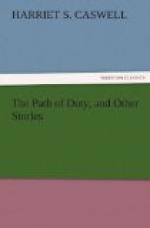This allusion to his ancient appearance was very mischievous on my part, and I regretted it a moment after; but he was so much pleased to learn that he had nothing to fear from the Indians that he readily forgave me for alluding to a subject upon which he was usually very sensitive. I remember taking a walk one afternoon during the haymaking season to the field where Terry was at work. Mr. —— had driven to the village with the farm horses, leaving Terry to draw in hay with a rheumatic old animal that was well nigh unfit for use. But as the hay was in good condition for getting in, and the sky betokened rain, he told Terry, upon leaving home, to accomplish as much as possible during his absence, and he would, if the rain kept off, draw in the remainder upon his return. As I drew nigh I spied Terry perched upon the top of a load of hay holding the reins, and urging forward the horse, in the ascent of a very steep hill. First he tried coaxing, and as that proved of little avail, he next tried the effect of a few vigorous strokes with a long switch which he carried in his hand. When the poor old horse had dragged the heavy load about half way up the hill, he seemed incapable of further exertion, and horse, cart, Terry and all began a rapid backward descent down the hill.
Here the boy’s patience gave way entirely. “Musha thin, bad luck to ye for one harse,” said he as he applied the switch with renewed energy. Just then I arrived within speaking distance and said, “Do you think, Terry you would be any better off if you had two of them.” “Not if they were both like this one,” answered he. I advised Terry to come down from his elevated position, and not add his weight to the load drawn by the overburdened animal. He followed my advice, and when with some difficulty we had checked the descending motion of the cart-wheels, we took a fair start, and the summit of the hill was finally gained.
“Its often,” said Terry, “that I’ve seen a horse draw a cart, but I niver before saw a cart drawing a horse.” There was one trait in the character of the boy which pleased me much; he was very grateful for any little act of kindness. He often got into difficulties with the family, owing to his rashness and want of consideration, and I often succeeded in smoothing down for him many rough places in his daily path; and when he observed that I interested myself in his behalf, his gratitude knew no bounds. I believe he would have made almost any sacrifice to please me. He surprised me one day by saying suddenly, “Don’t I wish you’d only be tuck sick.” “Why Terry,” replied I, “I am surprised indeed that you should wish evil to me.” “Indade thin,” answered he, “its not for evil that I wish it, but for your good jist to let ye see how tinderly I would take care uv ye.” I thanked him for his kind intentions, saying that I was very willing to take the will for the deed in this case, and had no wish to test his kindness by a fit of sickness.




